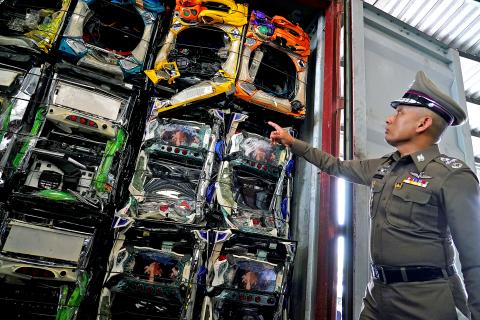Thailand is a new dumping ground for scrap electronics from around the world, police and environmentalists said, the latest nation to feel the impact of China’s crackdown on imports of high-tech trash.
Police at Laem Chabang port, south of Bangkok, on Tuesday showed seven shipping containers each packed with about 22 tonnes of discarded electronics, including crushed game consoles, computer circuit boards and bags of scrap material.
Electronic refuse, or e-waste, is turning up from Hong Kong, Singapore and Japan, police said, some of it imported by companies without the required permits.

Photo: Reuters
“This ... shows that electronic waste from every corner of the world is flowing into Thailand,” Deputy Police Chief Wirachai Songmetta said as he showed the containers to the media.
While “e-waste” — defined as any device with an electric cord or battery — can be “mined” for valuable metals such as gold, silver and copper, it can also include hazardous materials such as lead, mercury and cadmium.
Police said they filed charges against three recycling and waste processing companies in Thailand.
Anyone found guilty could be jailed for up to 10 years.
“The companies that we have filed charges against don’t have a quota to import even a single tonne of electronic waste,” Wirachai said.
China imposed a ban on overseas trash last year, telling the WTO that it would stop accepting imports of 24 types of foreign waste, leading some to fear that the waste could end up in neighboring nations.
The ban has upended the world’s waste handling supply chain and caused massive pileups of trash from Asia to Europe, as exporters struggled to find new buyers for the garbage.
Chinese state media last year estimated that more than 70 percent of the world’s 500 million tonnes of electronic waste entered China in 2016.
Environmentalists say waste once destined for China is being rerouted to Southeast Asian nations and new laws are needed or existing laws better enforced to prevent illegal imports.
“Especially after China’s ban, Thailand could become one of the biggest dumping grounds for e-waste,” Ecological Alert and Recovery Thailand director Penchom Saetang said.
Thailand in 1997 ratified the Basel Convention, which aims to control movements of hazardous waste, but the convention does not completely prohibit these exports from more developed to less developed nations.
“The Basel Convention cannot prevent what is happening in Thailand because it has its limitations,” Penchon said while calling for an amendment that would ban the shipments of e-waste.
Thai Prime Minister Prayuth Chan-ocha vowed this week to step up nationwide inspections as part of a plan to combat illegal electronic waste, but environmentalists say they have not seen the details of how it will work.
“It isn’t clear how he will do this,” Penchom said.

POLITICAL PRISONERS VS DEPORTEES: Venezuela’s prosecutor’s office slammed the call by El Salvador’s leader, accusing him of crimes against humanity Salvadoran President Nayib Bukele on Sunday proposed carrying out a prisoner swap with Venezuela, suggesting he would exchange Venezuelan deportees from the US his government has kept imprisoned for what he called “political prisoners” in Venezuela. In a post on X, directed at Venezuelan President Nicolas Maduro, Bukele listed off a number of family members of high-level opposition figures in Venezuela, journalists and activists detained during the South American government’s electoral crackdown last year. “The only reason they are imprisoned is for having opposed you and your electoral fraud,” he wrote to Maduro. “However, I want to propose a humanitarian agreement that

ECONOMIC WORRIES: The ruling PAP faces voters amid concerns that the city-state faces the possibility of a recession and job losses amid Washington’s tariffs Singapore yesterday finalized contestants for its general election on Saturday next week, with the ruling People’s Action Party (PAP) fielding 32 new candidates in the biggest refresh of the party that has ruled the city-state since independence in 1965. The move follows a pledge by Singaporean Prime Minister Lawrence Wong (黃循財), who took office last year and assumed the PAP leadership, to “bring in new blood, new ideas and new energy” to steer the country of 6 million people. His latest shake-up beats that of predecessors Lee Hsien Loong (李顯龍) and Goh Chok Tong (吳作棟), who replaced 24 and 11 politicians respectively

Archeologists in Peru on Thursday said they found the 5,000-year-old remains of a noblewoman at the sacred city of Caral, revealing the important role played by women in the oldest center of civilization in the Americas. “What has been discovered corresponds to a woman who apparently had elevated status, an elite woman,” archeologist David Palomino said. The mummy was found in Aspero, a sacred site within the city of Caral that was a garbage dump for more than 30 years until becoming an archeological site in the 1990s. Palomino said the carefully preserved remains, dating to 3,000BC, contained skin, part of the

Russian hackers last year targeted a Dutch public facility in the first such an attack on the lowlands country’s infrastructure, its military intelligence services said on Monday. The Netherlands remained an “interesting target country” for Moscow due to its ongoing support for Ukraine, its Hague-based international organizations, high-tech industries and harbors such as Rotterdam, the Dutch Military Intelligence and Security Service (MIVD) said in its yearly report. Last year, the MIVD “saw a Russian hacker group carry out a cyberattack against the digital control system of a public facility in the Netherlands,” MIVD Director Vice Admiral Peter Reesink said in the 52-page